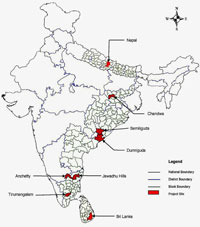project themes
Theme 1: On-farm conservation of crop varietal diversity and improvement of crop varieties
Crop varietal diversity is often perceived as antithetical to development or as a vestige of underdeveloped farming systems. The reasons for this perception are linked to contemporary advanced agricultural production systems, supported by intensive research and an enabling policy environment, which have eroded agro-biodiversity at both farm and agro-ecosystem levels. There is, however, a growing realization that crop varietal diversity, cultivated by small and marginal farmers in the global South, has enormous public value for ensuring global food security, poverty alleviation, and environmental sustainability. The research project examines the current state of crop varietal diversity of small millets in India, Nepal and Sri Lanka to understand the constraints and opportunities in promoting on farm conservation of crop varietal diversity. This project strives to strengthen farmers’ efforts to improve, use and conserve crop varietal diversity of small millets. This will be achieved through the following research activities in the project sites.
Documentation and characterization of agro-biodiversity of small millets
A systematic survey of existing varietal diversity of different small millets will be conducted in each project site using participatory tools such as Diversity Fairs (locating diversity) and Community Biodiversity Registers for documenting associated traditional knowledge. The study will focus on inter crop and intra crop varietal diversity in small millets based cropping system. The farmers’ taxonomy or folk classification will be used for identification and classification of crop genetic diversity. The data collected on crop genetic diversity will be analyzed for classifying varieties on the basis of their pedigree (farmers’ varieties from within and outside the region, modern varieties, and creolized varieties) and spatial distribution indicating richness and evenness. The scientific measures do offer precise information on classification but are extremely costly and labour intensive. This project will employ molecular or DNA level analysis at the University of Guelph Centre for Biodiversity Genomics only when genetic diversity is not manifested in distinctive morphology attributes.
Participatory varietal trials and evaluation
Promising genetic materials collected from documentation of agro-biodiversity and materials from gene banks will be selected on the basis of farmers’ yields, consumption, and local market preferences. Selected material will be used in participatory varietal trials, employing Mother and Baby trials. The mother trial will be established in farmers’ fields using Randomized Complete Block Design (RCBD) with one replicate allocated per farmer. These experiments will be researcher designed but farmer-managed with farmers’ normal level of input use. Data management will be done by researchers with major yield attributing parameters relevant for on-farm evaluation. Local male and female farmers and researchers will jointly visit the trial plots at the time of maturity of the crop to evaluate the performance of the varieties. After the visit to the trial plots, focus group discussions with women and men will be organized to rank the tested varieties.
Existing self-help groups (SHGs) and farmers’ groups (FGs) will be involved in seed multiplication of tested varieties in micro-plots to assure the project of enough seeds of preferred varieties for distribution to farmers under baby trials in subsequent years. For baby trials, one or two cultivars from the mother trial per farmer will be distributed to a large number of farmers through kits for testing in their plots. Unlike the mother trial, baby trials will be completely farmer managed with farmer inputs and supervision. The evaluation will be on the basis of farmers’ perceptions collected at the household level through a simple questionnaire.
Mapping of seed channels and improving farmers’ access to varietal diversity
Farmers’ networks play a significant role in flows of information and genetic materials. A network analysis approach thus will be used to explore and map seed flow channels and the processes involved in maintenance of crop diversity on-farm. A socio-metric survey will be used to obtain relational/linking data among individuals and institutions. Snowball sampling will identify the initial sample of respondents as ‘starters’ who will provide data on their socio-metric links. The socio-metrically indicated individuals then become second stage respondents, and they in turn lead to third stage respondents. The process ultimately will identify a network of individuals and institutions (seed sellers) linked through seed and information flows. The nodal persons identified in the network will be used by SHGs/FGs in provision of project identified varieties and information to enhance farmer’s access to diversity. The project will improve the farmers’ access to different seed sources (community, public, private), and support farmers’ visits across project sites for exchange of knowledge and practices as well as genetic materials. Seeds of lost varieties would be revived through mobilization of SHGs/FGs in local communities.
updates

